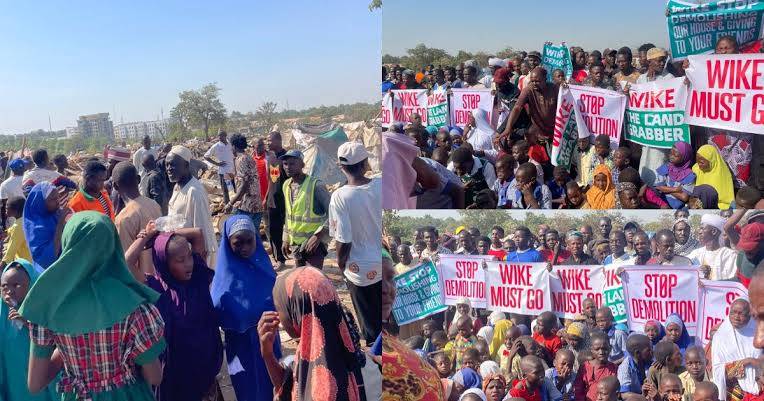Wike Under Fire: Massive Protests Erupt In Abuja Over 'Brutal' Demolition Wave By FCT Minister
A wave of public discontent erupted in Abuja recently as demonstrators took to the streets with banners calling for the resignation of the Federal Capital Territory (FCT) Minister, Nyesom Wike. Under the slogan “Wike Must Go,†the protest underscored growing frustrations over a series of controversial demolitions across the capital city, which have left many residents displaced and businesses shuttered.
The protestors gathered in central Abuja, voicing grievances about the rapid pace and scope of the demolitions, which they claim have been executed without adequate consultation or prior notice. Wike, who was appointed FCT Minister in August, has pushed for an aggressive urban renewal agenda aimed at transforming the city’s infrastructure, maintaining environmental order, and addressing encroachments on government land. However, critics argue that these measures have been excessive and poorly managed, leaving thousands of residents uncertain about the future of their homes and businesses.
The FCT minister has defended the demolitions as necessary steps in Abuja's long-term development plan. In several public statements, Wike has emphasized his commitment to enforcing city regulations, insisting that structures built on unauthorized land or without proper permits threaten Abuja’s infrastructure, aesthetics, and environmental sustainability. He has pointed out that illegal settlements, makeshift shops, and improperly sited buildings obstruct infrastructure projects, which include road expansions, drainage improvements, and public safety enhancements.
“People who build on unauthorized land put the entire city's development at risk,†Wike remarked in a recent press conference. “Our administration is committed to restoring Abuja to its original master plan. These demolitions are necessary to make Abuja a city we can all be proud of.â€
Nevertheless, residents and business owners argue that many of the affected structures have been in place for years, with some allegedly possessing official permits from past administrations. The demolition sweep has reportedly affected neighborhoods ranging from Jabi and Gwarinpa to high-density areas like Mpape, and some claim that entire communities have been destroyed within days of receiving notices.
For many residents and business owners, the demolitions have been devastating. “This is not just a loss of property; it’s a loss of livelihood,†said Ibrahim Musa, a small business owner in Gwarinpa whose shop was demolished last month. “We were not given enough time or support to find alternative spaces. My business, which I’ve worked on for years, was gone in hours.â€
Similarly, other displaced residents and property owners allege that they have faced hardship in relocating, with some forced to move far from their workplaces and schools. These personal stories have fueled the recent protests, with demonstrators calling Wike’s actions unjust and overly severe. They argue that his approach lacks empathy, particularly as Nigeria’s economy struggles with inflation and rising costs of living.
Human rights groups have also raised concerns over the impact of these actions on vulnerable populations. Some activists claim that demolitions have disproportionately affected lower-income residents who cannot afford to relocate easily. “These demolitions are unfairly targeting those who lack the resources to fight back,†noted Adanna Eze, a representative of a local advocacy group. “We are calling on the government to respect the rights of Abuja’s residents and provide alternatives rather than render people homeless.â€




No comments yet
Be the first to share your thoughts!